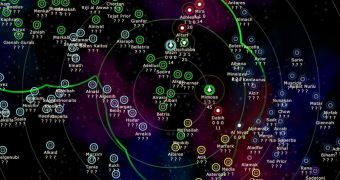I spent more time playing Neptune's Pride this year than I've spent playing any other game, with the possible exception of Football Manager 2011, but the free browser based strategy title never took more than 10 consecutive minutes out of my gaming life.
And the game created by Iron Helmet deserves a lot of praise for its long-term longevity and short term excitement which are paired with a set of quite basic yet engaging mechanics and a big serving of human interaction that never seems forced, as it is in other so-called social games.
The basic idea is easy to grasp: a number of galactic powers fight over a galaxy, developing planets, aiming fleets and developing new technology.
Each element taken separately is not too engaging, with the typical session meaning about five minutes spend on fleet preparation and 2 or 3 linked to resource management and planet development.
Tech decision take another maybe 30 seconds and a deep planning session with allies in a game that goes for more than two weeks might take up another ten minutes.
Yet Neptune's Pride is the kind of game which makes me stay awake on weekday well past my bedtime to issue new orders for my tip of the spear fleet, deep in enemy territory, once it captures a new planet and I get some more intel.
This is the kind of game which lead me to trick one of my friends that I was allying with him while planning a complex betrayal scheme with another unknown player, which involved opening a path of stars in my empire to allow him an attack route to my friend.
And despite the time spent playing Neptune's Pride can always throw out a new surprise move from another player that changes the way you approach the game.
It also makes sense to spend some money on the new game in order to get the ability to tweak initial game setup and create matches with higher technology acquisition rates and more planets per player.

 14 DAY TRIAL //
14 DAY TRIAL //